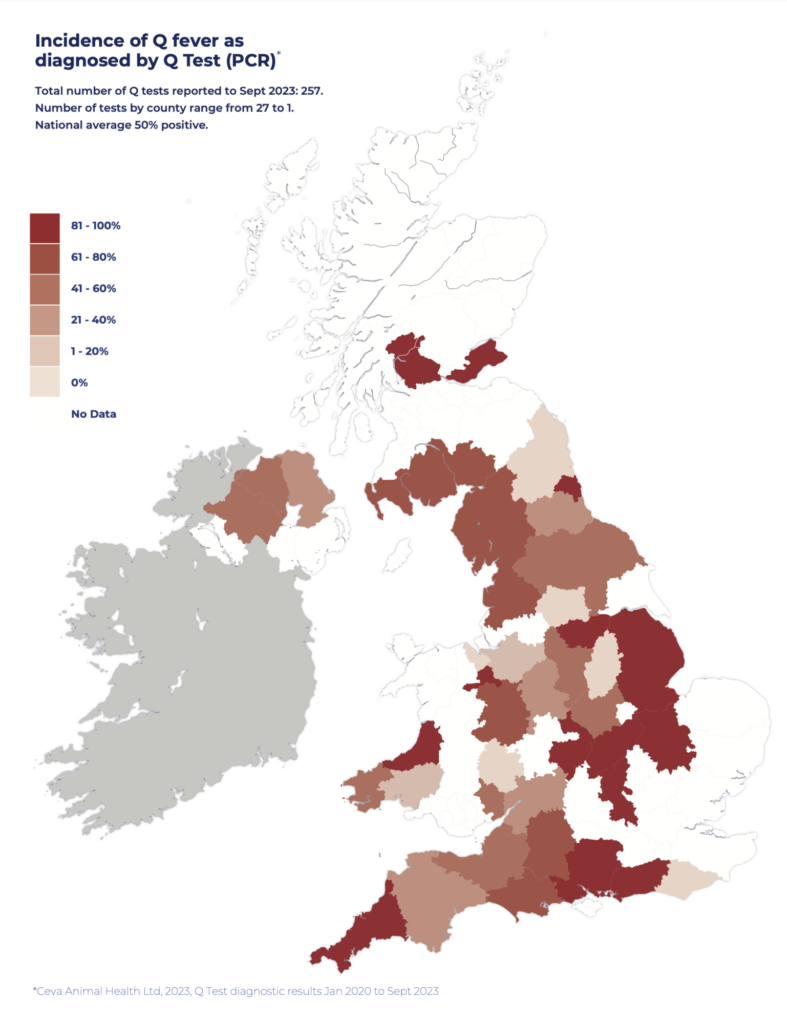“Underestimated” disease could be to blame for fertility issues
6th November 2023
Farmers experiencing a range of fertility issues in their dairy herds are being told to test for Q fever, as data from a recent study reveals 50% of herds tested were positive for the disease.

Data from 274 bulk milk tank PCR samples showed 50% of herds tested were positive for Q fever, according to Ceva Animal Health.
Q fever has been historically underestimated and awareness of the disease amongst farmers and related industries has been low – despite the fact that it’s been endemic in GB dairy herds for some years.
While Q fever has the potential to impact herd productivity, the disease is frequently overlooked as other infertility causes are often investigated first, which can lead to economic losses for farmers in the meantime, Ceva says.
The disease, which is caused by the bacterium Coxiella burnetii, is also zoonotic which makes it a health risk to those in contact with infected animals including farmers, farming families, vets and abattoir workers.
Infected dairy cattle generally do not display clinical signs, however these signs include: severe hyperthermia and rapid pneumonia in the acute phase (inflammatory stage) with spontaneous recovery over seven days.
In the chronic phase Q fever primarily affects reproductive performance in cattle and presents a serious threat to productivity. Signs reported in Q Test samples that tested positive include: Infertility (79%), abortions (71%), metritis/endometritis (36%), retained placenta (15%), and pregnancy loss/still borns/weak newborns (11%).
80% of farms test positive
Tom Angel, a veterinary surgeon at Synergy Farm Health, comments: “The bulk milk Q fever testing we have been undertaking in our practice has returned positive results in approximately 80% of farms sampled.”
It’s challenging for vets to determine the impact of Q fever on farm, he adds. “In some cases, where other causes have been excluded, signs such as increased pregnancy losses and still birth rates have been identified.
“However, on other units more subtle, but still costly effects, such as increased days open and increased transition disease may be attributable to Q fever.”
Supplementary diagnostics – such as serological testing of animals in different management groups, and the cost calculator from Ceva’s Q audit – have helped the practice develop vaccination protocols on different farms in a cost-effective manner.
Where vaccination protocols have been put in place, early results have been positive, with an apparent reduction in pregnancy loss and still births, Tom said.
“Whilst it is too early to assess any long-term impact of vaccination, these preliminary findings are encouraging and should increase the awareness and engagement from farmers and vets with this disease.”
New Q fever map
A new Q map from Ceva Animal Health highlights the incidence of Q fever in dairy herds throughout the UK based on the Q Test data.
Katherine Timms, ruminant veterinary advisor at Ceva Animal Health, says: “The Q map clearly demonstrates that Q fever is endemic throughout the UK and it will be updated on an ongoing basis.
“Diagnosis can be challenging, as it is similar to many other diseases in dairy herds, however farmers should ask their vet to investigate the disease if cows in their herd are experiencing fertility issues; these include unexplained abortion and still birth, high levels of metritis and endometritis, or if there is unexplained poor fertility performance such as repeat breeding, higher calving to conception rate and embryo loss.”
For further information please contact your local vet. To view the Q map or for further information on Q fever go to: www.qfever.co.uk.

